
August 2018
Iowa State Selected to Lead National Antimicrobial Resistance Research & Education Center
 Iowa State University has been selected to establish and host a new national Institute for Antimicrobial Resistance (AMR) Research and Education. The Association of Public and Land-grant Universities (APLU) and the American Association of Veterinary Medical Colleges (AAVMC) chose Iowa State to lead the institute, which will utilize a One Health approach to comprehensively tackle the AMR problem.
Iowa State University has been selected to establish and host a new national Institute for Antimicrobial Resistance (AMR) Research and Education. The Association of Public and Land-grant Universities (APLU) and the American Association of Veterinary Medical Colleges (AAVMC) chose Iowa State to lead the institute, which will utilize a One Health approach to comprehensively tackle the AMR problem. Antibiotic-resistant bacteria, according to the CDC, cause at least 2 million illnesses and 23,000 deaths in the United States every year. Infections caused by these pathogens cost an estimated $20 billion a year in direct health care costs and up to $35 billion in lost productivity due to hospitalizations and sick days. Experts believe the misuse of antibiotics in animal agriculture and over-prescription and patient non-compliance in human healthcare are leading contributors to the AMR problem.
The new institute is the result of a joint Task Force on Antibiotic Resistance in Production Agriculture that AAVMC and APLU created in 2014, which released a report the following year that offered an array of research and education recommendations designed to address the problem utilizing a One Health approach. One Health is an emerging approach in healthcare that involves veterinarians, physicians and other scientific experts working closely together to attain optimal health for people, animals and the environment. The report called for the creation of an Institute for Antimicrobial Resistance Research and Education to coordinate the implementation of the report’s recommendations.
“The misuse of antibiotics is a major reason why antimicrobial resistance is a rapidly growing threat to human, animal, and environmental health,” said Ian Maw, APLU’s Vice President Food, Agriculture & Natural Resources. “While the problem is well understood, the path to advancing solutions has been blurry. It’s clear we need a coordinating body to organize research and education activities so we can make meaningful progress to reverse this trend. Solving big problems like antimicrobial resistance goes right to the heart of the research and engagement missions of public and land-grant universities.”
“This represents the culmination of a lot of work accomplished by many different people and organizations working within the APLU/AAVMC partnership,” said AAVMC CEO Dr. Andrew T. Maccabe. “With a broad and deep level of expertise, resources, and relationships in place, Iowa State University is well-positioned to step up and lead this new national institute. Building upon an existing multi-center initiative makes a great deal of sense.”
Iowa State’s application to establish the new institute was structured upon plans to substantially upgrade an existing university-based research and education program called the Antimicrobial Resistance Consortium. Formed three years ago, that consortium was beginning to address some of the same issues outlined in the task force report. Dr. Paul Plummer of Iowa State University, who leads the existing Consortium, will serve as executive director of the new institute.
“Antimicrobial resistance touches each of us in our daily lives. This new institute provides a great resource for the entire country as we work to build strong, collaborative research and educational programs to mitigate this risk,” said Plummer, associate professor of veterinary diagnostic and production animal medicine at Iowa State.
As the leader of the new institute, Iowa State will partner with the University of Nebraska-Lincoln, as well as the University of Nebraska Medical Center, the University of Iowa, and the Mayo Medical Clinic – all of which are involved with its existing consortium. The institute will also partner with two major USDA Agricultural Research Service (ARS) facilities, as well as a collection of agricultural stakeholders representing over one-fourth of the U.S. swine and beef industry.
As envisioned, the institute will serve as a national resource for coordinating and focusing the efforts of various stakeholders, organizations and institutions from academia, government and industry. The institute will embrace and coordinate multidisciplinary approaches for fundamental, translational, and applied research; implement and evaluate education and training efforts to address the challenges of AMR; and identify effective interventions to reduce or prevent AMR among people, animals, and the environment.
A review committee selected the Iowa State University proposal from among nine submitted by major universities from throughout the nation because of the depth of existing activities and resources already in place.
Iowa State will provide office space and IT support for the institute, which will initially be jointly funded by Iowa State and the University of Nebraska at $525,000 per year for three years ($1.575 million total investment). The institute will also be supported through grants and membership in the consortium. An independent board of directors will govern the institute. Iowa State and its partners and stakeholders will work with APLU and AAVMC to develop a governance structure, including an independent board of directors to oversee the institute.
CBVE Initiative Building Momentum
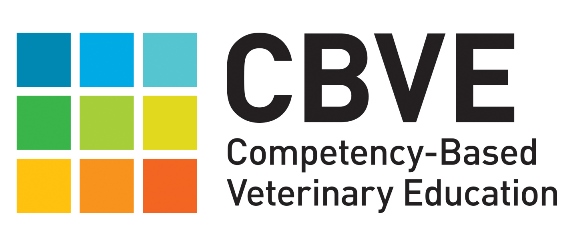 The Working Group on Competency-Based Veterinary Education (CBVE) has been hard at work since the rollout of the CBVE Framework and Core Entrustable Professional Activities at the AAVMC Annual Meeting in March 2018.
The Working Group on Competency-Based Veterinary Education (CBVE) has been hard at work since the rollout of the CBVE Framework and Core Entrustable Professional Activities at the AAVMC Annual Meeting in March 2018. “I have been really thrilled to see the excitement that this work is generating at so many veterinary schools,” said CBVE Working Group member Dr. Kathy Salisbury. “Some have begun to map their outcomes to the CBVE Framework, looking for gaps and stimulating discussions among their faculty about potential changes.”
The Working Group is encouraged by the emerging opportunity to use the CBVE Framework as a shared language to drive collective improvement in veterinary education. They are also excited about the potential to use “big data” to better understand and support the progression of students toward competency.
“By using common domains and competencies, we can now work together and drive continuous improvement which will benefit our learners as well as our profession,” said CBVE Working Group member Dr. Stephen May.
The Working Group hosted a webinar for AAVMC Academic Affairs Committee members on August 3. Next steps for the group include gathering feedback on the CBVE milestones that have been drafted to describe how learners would progress in the development of each competency.
Since the March rollout, the group members have received invitations to present more about CBVE through videoconferences and visits to schools including Florida State University, Oregon State University, Midwestern University, University of Pennsylvania and Western University of Health Sciences.
Group members also continue to present the work at national and international meetings including the joint Primary Care Veterinary Educators/Veterinary Educator Collaborative at Cornell, the VetEd Symposium at Utrecht, and the 2nd International Competency-Based Medical Education Summit in Basel, Switzerland.
Efforts are also underway to develop a Spanish version of the CBVE framework for use in some international member institutions.
AAVMC Presents Summer Meeting in Denver
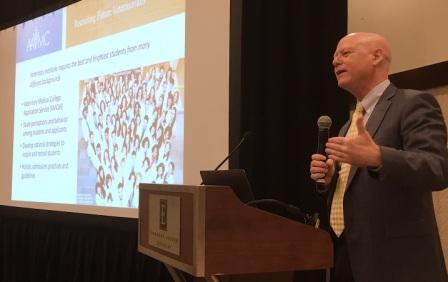
While in Denver for the AAVMC Summer meeting, CEO Maccabe also
addressed the Association of Veterinary Advancement Professionals (AVAP).
AAVMC Senior Accreditation Advisor Dr. Sheila Allen briefed the group on recent activities with the Council on Education (COE). After discussing standards changes ratified in March 2018 and providing other updates, Allen told the group that the Department of Education’s scheduled five-year review of the COE was being postponed until spring of 2019 with the public comment component period of the review scheduled for fall 2019. She said the AAVMC will send a request for input from deans in fall 2018.
AAVMC President Calvin Johnson then discussed the importance of advocating for the benefits of professional licensing in the profession of veterinary medicine. Johnson explained that some consumer activist groups have been attacking state mandated licensing requirements in various professions, claiming overregulation and restriction of competition in the marketplace. Professional licensing exists to protect public wellbeing, Johnson said, and is particularly important in the health professions where it ensures high standards of competence and clinical practice. The AAVMC plans to develop a position statement in support of licensing in veterinary medicine.
Dr. Marji Gilmour, associate dean for academic affairs at the Oklahoma State University Center for Veterinary Health Sciences and American Board of Veterinary Specialties (ABVS) liaison to academic veterinary medicine, then discussed recent activities with the ABVS, including the issue of veterinary specialties charging registration fees for residency programs.
AAVMC Governmental Affairs Director Kevin Cain briefed the group on major provisions of the Farm Bill relevant to veterinary medicine and its present status within the 115th Congress. A 47-member conference committee has recently been established to reconcile House and Senate versions of the bill.
Dr. Linda Lord from Merck Animal Health presented an overview of the sweeping Merck Wellbeing study, which analyzed the current state of mental health and wellness in the profession. Drs. Kent McClure and Gail Golab from the AVMA made a presentation on the status of Telehealth in veterinary medicine, and AVMA Vice-President Dr. Stacy Pritt made a presentation on her activities. During a “Hot Topics and Open Discussion Period” introduced this year, deans were provided an opportunity to raise issues and comment on a variety of matters within academic veterinary medicine.
AAVMC Officers for 2018-19 include: Dr. Calvin Johnson, dean of the Auburn University College of Veterinary Medicine, president of the AAVMC; Dr. Michael Lairmore, dean of the University of California – Davis School of Veterinary Medicine, president-elect; Dr. Phillip Nelson, dean of the Western University of Health Sciences College of Veterinary Medicine, past-president. Dr. Mark Markel, dean of the University of Wisconsin School of Veterinary Medicine, continues in his role as Treasurer; and Dr. Paul Lunn, dean of the North Carolina State University College of Veterinary Medicine continues his term as Secretary.
COHA Scientists Discuss Comparative Research During Legislative Briefing on Capitol Hill
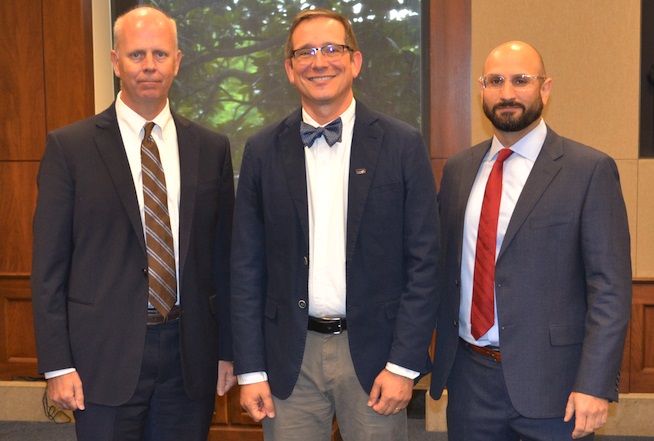
Pictured, left to right: Dr. Huggins, Dr. Kent, and Dr. Monjazeb. Not pictured: Dr. Kurilla.
- The National Center for Advancing Translational Sciences’ Director of Clinical Innovation Dr. Michael G. Kurilla outlined the value of translational research for assembled guests.
- Tufts University School of Medicine Cardiologist Dr. Gordon Huggins discussed research into Hypertrophic Cardiomyopathy in cat models.
- UC-Davis School of Veterinary Medicine Radiation Oncology Professor Dr. Michael Kent discussed “The Dog as a Model of Human Cancer.”
- UC-Davis Comprehensive Cancer Center Investigator for Cancer Immunotherapy Dr. Arta M. Monjazeb discussed “Cancer Immunotherapy: Re-awakening the Immune System to Cure Cancer.”
Fifteen AAVMC member institutions are members of the Clinical and Translational Science Award One Health Alliance (COHA). Click here to see a fact sheet on COHA.
Fix-the-Debt Evolves into Veterinary Debt Initiative: Focus on Opportunity, Sustainability
 Volunteers working with the Veterinary Debt Initiative (VDI) heard updates, reviewed progress, and considered future action during a July 14 meeting in Denver. The VDI is currently led by representatives from the AVMA, the AAVMC and the Veterinary Medical Association Executives (VMAE).
Volunteers working with the Veterinary Debt Initiative (VDI) heard updates, reviewed progress, and considered future action during a July 14 meeting in Denver. The VDI is currently led by representatives from the AVMA, the AAVMC and the Veterinary Medical Association Executives (VMAE).Evolving from the former Fix the Debt Initiative (which arose from an April 2016 symposium held at Michigan State University), the present organization is taking a more opportunistic, strategic approach to addressing financial aspects of veterinary education and practice, such as the cost of veterinary education, leveraging debt, and negotiating and managing income.
Whereas the FTD initiative was focused on reducing the debt-to-income ratio from about 2:1 to 1.4:1 and increasing salaries, the new initiative is embracing a broader, more organic goal: to help veterinarians thrive in financially sustainable and rewarding careers.
Leaders have developed a new strategic framework based upon three spheres of influence: the individual, the veterinary profession and society. Specific objectives are being formulated within each of the spheres and will be implemented based upon feasibility. Like the FTD initiative, the VDI will still focus programming on a continuum from DVM student to working professional.
Future plans call for hiring a part-time project manager, further articulating and establishing a timetable for program development, developing “think pieces” and other communications, and devising metrics to gauge program success.
During the meeting AAVMC CEO Dr. Andrew T. Maccabe announced that the AAVMC has created a new professional award which recognizes institutional excellence in raising money from non-public sources to support scholarships for DVM students.
A variety of topics were discussed during the VDI meeting, including the current veterinary economic environment and AVMA/AAVMC advocacy programs underway in Washington designed to bolster the profession.
VDI sponsored programming at the annual AVMA conference included “Repayment strategies for veterinarians,” “Career management: What this means and why you should start now,” and “Negotiations for Millenials: How to ask for what you’re worth.”
Read a detailed story on the Veterinary Debt initiative in JAVMA News here.
AAVMC Establishes Institutional Award for Fundraising Excellence in Student Scholarships
 The AAVMC has created an annual award to inspire and recognize professional excellence and achievement in fundraising for student scholarships among member institutions. The AAVMC Award for Fundraising Excellence in Student Scholarships will consist of a $1,000 honorarium and a commemorative. It will be presented in conjunction with the annual meeting of the Association of Veterinary Advancement Professionals (AVAP).
The AAVMC has created an annual award to inspire and recognize professional excellence and achievement in fundraising for student scholarships among member institutions. The AAVMC Award for Fundraising Excellence in Student Scholarships will consist of a $1,000 honorarium and a commemorative. It will be presented in conjunction with the annual meeting of the Association of Veterinary Advancement Professionals (AVAP). “Creating this award is part of our strategic interest in helping advance the Veterinary Debt Initiative,” said AAVMC CEO Dr. Andrew T. Maccabe, noting that the award is exclusively focused on scholarship resource development and is not intended to recognize comprehensive program excellence in fundraising. “Increasing the amount of scholarship resources available for students in our member institutions is a viable strategy for creating a more financially sustainable operating environment for our students and recent graduates.”
All resources considered within the award program must be non-public sector resources (private, corporate and foundation gifts) specifically earmarked for student scholarships. Planned vs. actual gifts will be officially recognized based upon established standards in professional fundraising.
Development programs within any AAVMC member institutions are welcome to participate in this recognition program and the performance window evaluated will conform with the calendar year prior to the year in which the honor is awarded. The nomination period for the inaugural award will run from January 1-March 31, 2019.
To ensure equal opportunities for all institutions regardless of staff size and scope of program, judges will evaluate qualitative data which details new and innovative strategies for increased productivity in this area, program goals and implementation, resources applied (human and otherwise), and results. More detailed information relative to the award will be announced later in the year.
The new award will complement the AAVMC Communications Excellence Award, which was established in 2013, and more fully express the AAVMC’s broader goal of encouraging excellence in institutional advancement among member colleges and schools.
Faculty Fellow Christine Kreuder Johnson from UC-Davis Capitalizes on Her Time in Washington
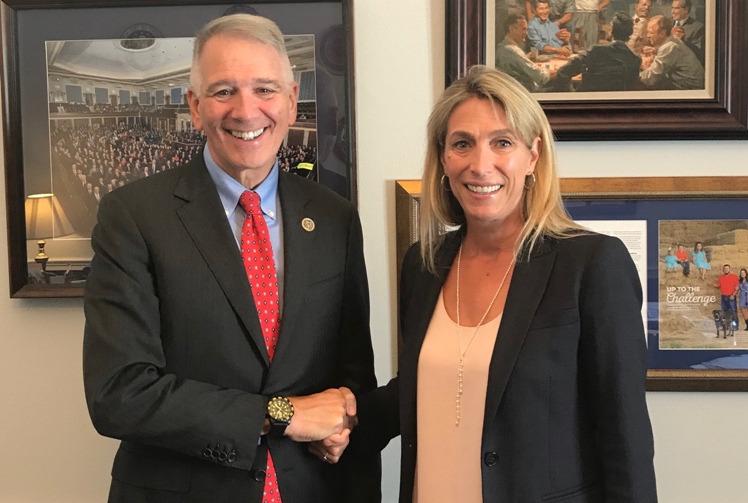
Dr. Johnson (right) discussed One Health issues with members of Congress,
including
Congressman Ralph Abraham (R-LA), a veterinarian and physician.
Dr. Johnson specializes in wildlife epidemiology, with a special emphasis on wildlife population health and emerging infectious diseases, so she was able to provide policymakers with a veterinary perspective on how scientists and educators can engage with policymakers to take steps to combat the threat of emerging and potentially pandemic diseases.
“It’s so important to engage face-to-face with law- and policy-makers,” said Dr. Johnson, a professor and researcher in the Department of Medicine and Epidemiology at the University of California Davis School of Veterinary Medicine. “I was able to see what their needs are, where they’re getting their information and how we (veterinarians) can provide needed expertise regarding science policy, public health and global health security.”
The AAVMC initiated the faculty fellows program in 2015 to help AAVMC member institutions’ faculty representatives develop leadership skills in the advocacy arena, explore the importance of public policy decisions to the profession, and gain overall knowledge of the legislative and regulatory process at the federal level.
The fellowship is also designed to help participants use their knowledge and experience to work as leaders in advocacy and public policy at their home institutions.
Dr. Johnson describes the fellowship as a rewarding experience that enabled her to connect with decision-makers and explain the important role that veterinarians play in the prevention of disease creation and transmission. “Veterinarians are uniquely qualified to address zoonotic diseases because we have a multi-species approach and we see that connection between animals and people and how they interface,” she said.
At UC Davis, Dr. Johnson is a member of the school’s One Health Institute team and one of the leads on the USAID PREDICT Project, which works in more than 30 countries to enable global surveillance for pathogens that can spillover from animal hosts to people. She also directs the UC-Davis EpiCenter for Disease Dynamics, which develops innovative tools to evaluate animal, human and environmental mechanisms underlying disease emergence and distribution.
She received a BS degree in Zoology and Political Science from Duke University, her VMD from the University of Pennsylvania, and MPVM and PhD degrees from UC Davis before joining the faculty in 2006.
In the past, Dr. Johnson has worked with California state agencies on the protection of wildlife corridors and finding solutions to challenging environmental questions, but she says that this fellowship enabled her to broaden her experience and gain new insight from a federal standpoint.
She also worked with the AAVMC’s Director of Governmental Affairs Kevin Cain to learn more about the AAVMC’s advocacy work and how the AAVMC connects with the federal government.
She “absolutely” encourages other faculty who may have an interest in science, research and policy to apply for the program. “I learned a lot from the AAVMC, it was a great experience and I need to come back,” she said.
Past public policy fellows include Dr. Sarah Allison from the University of Illinois, Dr. Suzie J. Kovacs from the Western University of Health Sciences, Dr. Marcy Souza from the University of Tennessee and Dr. Jeffrey Musser from Texas A&M University.
Agriculture Secretary Perdue Visits Washington State University
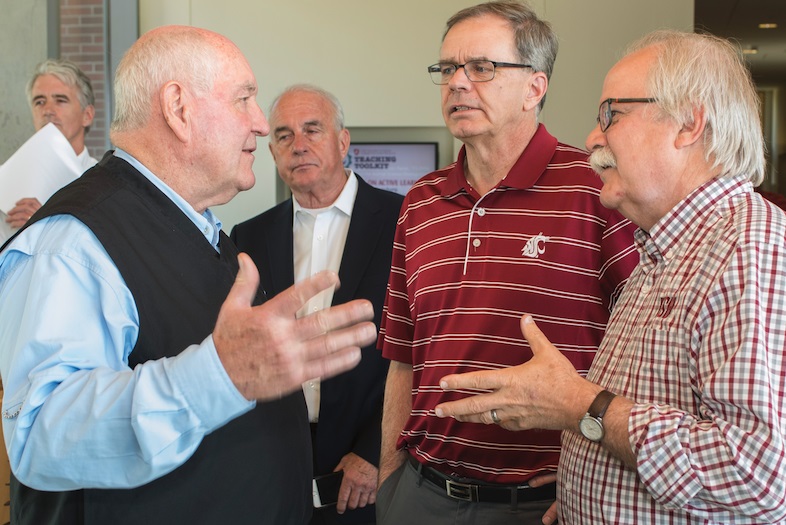
WSU-CVM Dean Dr. Brian Slinker (right) chats with Secretary Perdue (left).
U.S. Secretary of Agriculture Sonny Perdue visited another AAVMC member institution on Monday, July 2 when he spent time touring Washington State University’s College of Veterinary Medicine. Perdue met with WSU College of Veterinary Medicine Dean and AAVMC board-member Dr. Brian Slinker as part of the visit.
Perdue discussed a variety of issues while on site, including the status of the Farm Bill, the need for greater food productivity and security. Secretary Perdue’s recent travel schedule has involved visiting several U.S. land-grant universities. He said he enjoys traveling to various regions of the country and visiting people representing different aspects of the nation’s diverse agricultural community.
Donald Smith’s Legacy Honored with Learning Center Dedication at Ross University
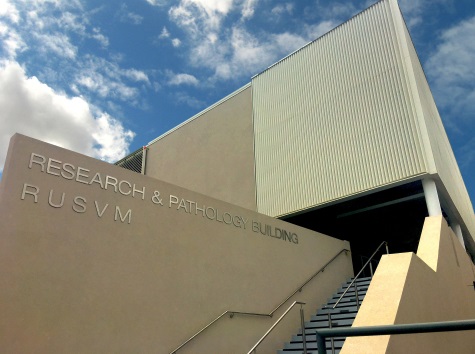 Part of a new Research and Pathology Building recently constructed on the campus of the Ross University School of Veterinary Medicine (RUSVM) will honor the late Donald S. Smith, a renowned and prolific veterinary educator who passed away in 2016. The Dr. Donald F. Smith Learning Center will help commemorate his profound contributions to the profession.
Part of a new Research and Pathology Building recently constructed on the campus of the Ross University School of Veterinary Medicine (RUSVM) will honor the late Donald S. Smith, a renowned and prolific veterinary educator who passed away in 2016. The Dr. Donald F. Smith Learning Center will help commemorate his profound contributions to the profession.Smith, a former dean of the Cornell University College of Veterinary Medicine who also served as a Trustee of the RUSVM, authored the AAVMC’s 2016 “Pathways to Progress” book, which chronicled the history and development of academic veterinary medicine and the AAVMC as part of the AAVMC’s 50th anniversary celebration.
Smith was also a strong advocate for supporting increased leadership roles for women in the profession and wrote Leaders of the Pack: Women and the Future of Veterinary Medicine, which was co-authored by Julie Kumble and released in 2017. He also contributed substantial material to the Journal for Veterinary Medical Education (JVME) and wrote a popular blog called “Veterinary Legacy” that chronicled the history of veterinary medicine.
“Ross University School of Veterinary School Medicine is proud to carry on Don Smith’s advocacy for female leadership in our profession,” said Dr. Sean Callanan.
Dr. Smith was a Diplomate of the American College of Veterinary Surgeons (ACVS) and a member of the National Academies of Practice.
Dr. Smith’s wife and children were present during the dedication ceremony. A plaque that includes his portrait and biography is displayed inside the learning center.
The $10.5 million, 19,000 square-foot building will facilitate multidisciplinary research collaborations and provide an academic platform for students and faculty to address pressing One Health issues.
“For the last 35 years, the island of St. Kitts has benefited from the presence of Ross University School of Veterinary Medicine, its contributions to the community and the health of our animals and ecosystems,” said Timothy Harris, Prime Minister of St. Kitts and Nevis, during ceremonies.
In the News
Iowa State Selected to Establish Bacteria Research CenterAP/U.S. News & World Report
New National Center at ISU to Coordinate ‘Super Bug’ Research
Radio Iowa
ISU to Lead National Antimicrobial Research, Education Center
Veterinary Practice News
Auburn University Researchers Work to Ensure Safety of Local Foods
Bovine Veterinarian
New Aim of Debt Program is Helping Veterinarians Thrive
JAVMA News
Puschner Assumes Michigan State Deanship, Baker Worked to Reduce Educational Debt
JAVMA News
Popular Grain-Free Dog Foods May Be Linked to Heart Disease
New York Times
Shortage Of Large-Animal Vets Leaves Markets Vulnerable To Disease Outbreaks
NPR
University of Tennessee, Knoxville Gets $2.8M Grant to Make Veterinary Care More Accessible
Knox News (USA Today network)
Pfizer Suspends Sales of Injectable Opioids for Veterinary Use
VIN News
Auburn Researchers Find Food Safety Gaps at ‘Local’ Farms
Food Safety News
The Bladder Can Regenerate Like Nobody’s Business and Now We Know Why
Medical Xpress
Regenerative Medicine Therapy Now Available for Horses at Veterinary Health Center
The Horse
Man’s Best Friend: Now Dogs Can Help us Fight Cancer, Researchers Say
WRAL
Is the Veterinary Profession Diverse?
Veterinarian’s Money Digest
Colorado State Launches Certificate in Spanish for Animal Healthcare
DVM360
Help Wanted: Rural Veterinarians
Farm Journal’s Pork
Grain-free Dog Foods May be Linked to Heart Disease
Sun Chronicle
LMU Vets to Study Canine Heartworm in Region
Middlesboro Daily News
Tuskegee and Auburn Universities Team Up to Boost Diversity in Academic Veterinary Medicine
The Journal of Blacks in Higher Education
Texas A&M Vet School Tells Texas Tech: This State Ain’t Big Enough for the Two of Us
My High Plains
WSU Researchers Map DNA Damage Links to Onset of Skin Cancer, Melanoma
ECancer News
Enlightenment Through Scientific Discovery
Medium
One Health to the Rescue: Intracranial Arteriovenous Malformation in a Dog
American Veterinarian
From Our Members
University Selects First Cohort of NBAF Scientist Training Program Fellowships Funded by $1.6 Million Federal Grant
Kansas State
Cat Becomes First Recipient of Surgical Spinal Technique in U.S.
Cornell University
New Mizzou Company to Produce Promising Spinal Muscular Atrophy Drug
University of Missouri
Small Animal Community Practice Combines Technology and Care
Cornell University
Research Team Studies Dog Welfare in Commercial Breeding Kennels
Purdue University
Texas A&M’s CET, PCVE Collaborate To Create Primary Care Educational Resources
Texas A&M
People in Motion
Grooms Named Dean of Iowa State Veterinary College“Like” us on Facebook or follow us on Twitter:




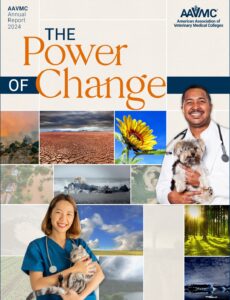
SHARE